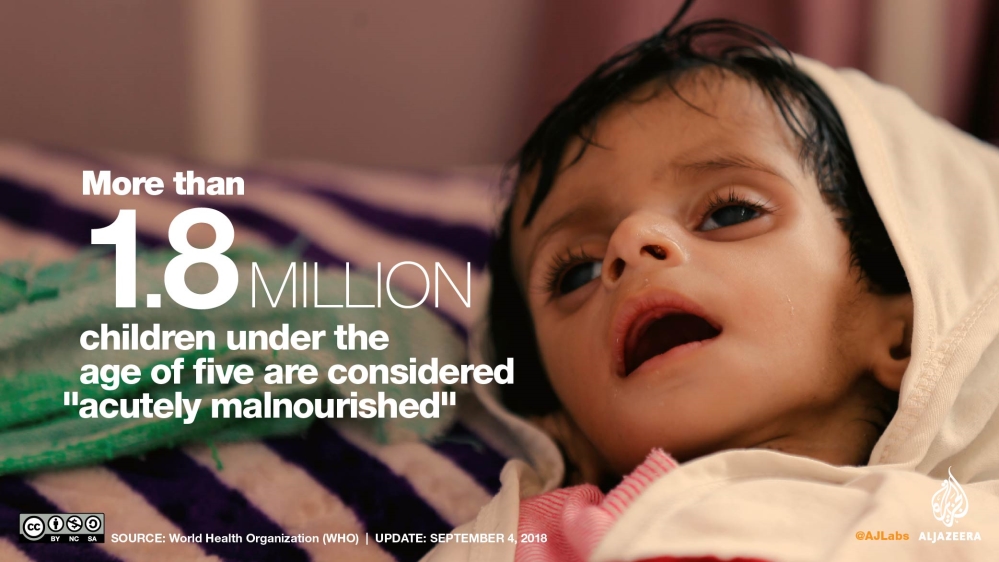Houthis reject Yemen government’s proposal over Sanaa airport
Rimbo, Sweden – Yemen’s Houthi rebels have rejected a proposal by the Yemeni government to re-open Sanaa international airport, saying the offer tabled was not in “accordance to international standards”.
The Yemeni government proposed to reopen the facility on Friday but said one of its conditions was that planes be inspected in Aden or Seiyoun airport, which are under the control of a Saudi-UAE coalition at war with the Shia movement.
Marwan Dammaj, a member of the government delegation, said the facility in Sanaa would only be re-opened to domestic flights to put “an end to the people’s suffering regarding transportation”.
The airport has been under Houthi control since 2014, and has been repeatedly bombed the alliance, with planes, the runway and the main terminal building suffering severe damage.
“We came here to find a solution in opening the airport in Sanaa,” Dammaj told Al Jazeera.
“What we are asking is: ‘Is this in the interest of people or not?’ We are not here to reward the Houthis, we are here for peace.”
Yemen’s warring sides have been meeting in the Swedish town of Rimbo since Thursday for talks aimed at discussing ways to end the fighting that has killed an estimated 56,000 people and left a staggering 22 million needing humanitarian assistance.
Closing the airport doesn’t have any military advantages. Instead, it harms only those who are in need for medical treatment.
Osamah Alfakih, director of media, communications and advocacy at Mwatana for Human Rights
‘Unbearable suffering’
The UN special envoy for Yemen, Martin Griffiths, is seeking to introduce a set of confidence-building measures including large-scale prisoner swaps, negotiations on a ceasefire in Hodeidah and the reopening of Sanaa international airport.
|
WATCH: Yemen’s warring sides gather in Sweden for peace talks (2:45) |
The head of the Houthi delegation at the peace talks, Mohammad Abdul Salam, rejected the government’s proposal, telling Al Jazeera: “The airport should be opened in accordance to international standards,” adding that the rebels would “not accept inspections”.
Osamah Alfakih, the director of media, communications and advocacy at Mwatana for Human Rights, said the closure of the airport had caused “unbearable suffering”, adding it “must come to an end”.
“Closing the airport doesn’t have any military advantages. Instead, it harms only those who are in need for medical treatment”.
Despite the apparent stalemate, the talks in Rimbo, a town some 60km north of the Swedish capital Stockholm, have already yielded breakthroughs, with both sides agreeing to large-scale prisoner swaps.
Hodeidah offensive is still an option
Earlier this week, the Yemeni government said it agreed to a prisoner swap with the Houthis, with media reports suggesting as many as 2,000 pro-government forces could be exchanged for 1,500 Houthis.
But the fate of Hodeidah, a city on Yemen’s western coast that houses the country’s most valuable port, could be a major stumbling block.
Following months of deadly battles in the city, the Houthis told Al Jazeera they were willing to hand over the strategic port to the UN in exchange for a ceasefire.
They haven’t, however, commented on whether they would leave the city.
The Yemeni government warned that if the rebels refused, a military offensive was still on the table.
“We are attending these negotiations in response to calls by the international community, the UN and the UN envoy. We are still looking into means towards peace,” Othman Al Mujalli, Yemen’s agriculture minister said.
“But if they [the Houthis] are not responsive, we have many options, including one that involves launching a military offensive,” Al Mujalli added.
‘Alternative to the narrative of conflict’
Abdul Malik al-Ajri, a senior Houthi leader, told Al Jazeera: “If we are to agree, we need a governing authority that represents all of Yemen and to which all parties will hand over weapons.”
Abdul Salam, the head of the Houthi delegation, added that the port “must be kept out of any military operation”.
He told Al Jazeera that a new government should be “formed first, before all parties are disarmed”.
The UN Special Envoy for Yemen, Martin Griffiths, who has engaged in intensive diplomacy between the two sides for months, has urged the two sides to be “realistic” and “deliver a message at peace”.
“The people of Yemen know the desperate situation they face on a daily basis,” Griffiths said at at the start of the talks.
“The discussions we have will offer an alternative to the narrative of conflict,” the envoy said.
According to aid groups, the stakes could not be higher. The beginning of the talks coincided with the release of a World Food Programme survey, which found 20 million people are going hungry and are in urgent need of food assistance.
According to recent estimates, as many as 85,000 children may have died from hunger since the begining of the war in March 2015.
 |




